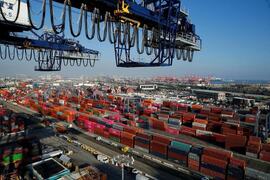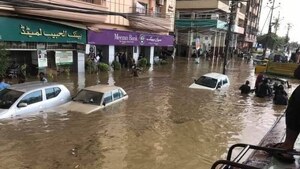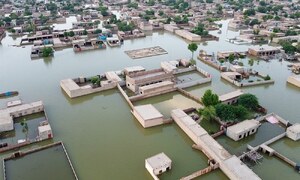British Prime Minister Gordon Brown called President Asif Ali Zardari on the Eid Day to discuss, reports said, some bilateral issues. Details of the discussion are not available but judging from what Brown had to say in a television interview the next day, he had called our president for a finger wagging conversation session rather than to wish him and the people of Pakistan a happy Eid.
In a Fox News interview, the British prime minister said, albeit indirectly, the same thing US Secretary of State Hillary Clinton had said in Lahore last month more directly about the alleged presence of al Qaeda leadership in Pakistan, accusing our government of connivance. Said he, "People are going to ask why, eight years after 2001, Osama bin Laden has never been near to being caught... and what can the Pakistan authorities do that is far more effective."
Actually, those interested would be well advised to direct their query at Washington, whose stated objective in declaring war on Afghanistan was to catch or eliminate al Qaeda leadership. The US failed in that mission not because of something Pakistan did or did not do, but due to its own slip up. A new report of the US Senate Foreign Relations committee squarely lays the blame for bin Laden's escape from his Tora Bora mountain hideout on the shoulders of the then Defence Secretary Donald Rumsfeld and US forces commander General Tommy Franks.
According to the report, the US command relied on air strikes, Special Operations, CIA officers and untrained Afghan militants to go after bin Laden, and on loosely organised Pakistani army units to block his escape. But the vast array of American military power - from sniper teams to the most mobile divisions of the Marine Corps and the Army - was kept on the sidelines.
The report arrives at the obvious conclusion: "the failure to finish the job represents a lost opportunity that forever altered the course of the conflict in Afghanistan and the future of international terrorism, leaving the American people more vulnerable to terrorism, laying the foundation for today's protracted Afghan insurgency and inflaming the internal strife now." However, this report, too, says bin Laden escaped to Pakistan.
If one accepts, for argument's sake, that after escaping from under the noses of American forces bin Laden and his men took refuge in Pakistan, then the following questions arise: Why would Pakistan purposely allow him to stay on? What can it hope to achieve by sheltering him? Equally important, if the US and Britain say that they know that Pakistani authorities know about bin Laden and company's presence and also whereabouts in Pakistan, why can't they confront Pakistan with the precise information they have to demand action.
Our government has repeatedly been saying give us the intelligence and we will act. Considering that the US Predator drones have been regularly targeting suspected Taliban and al Qaeda militants on the Pakistani territory, causing heavy civilian casualties, the US actually does not have to wait for Pakistan to act.
The fact of the matter is that right from the beginning of the campaign in Afghanistan Pakistan had maintained it was important to focus on al Qaeda rather than the Taliban, the rationale being that whereas the former had a global agenda the latter were local people fighting to oust foreign occupation. The US' arrogance did not allow it to accept that reasoning; it started accusing Pakistan of maintaining its old contacts with some influential Taliban groups. After eight years of a losing war, the US and its allies have come around to recognise the worth of that logic.
They now seek a negotiated peace with the Taliban, and elimination of al Qaeda. This they have decided after defeat became imminent. Their people are getting impatient and want their troops back home as soon as possible. To cover up their failure the US and Britain need two things: one, a scapegoat to lay the blame for losing the war, and the other to shift the burden of fighting to the Kabul government forces and Pakistan to pave the way for their own exit from Afghanistan.
Hence, Pakistan is being accused of deliberate inaction regarding Osama bin Laden's presence in the country. It is also being pressured to expand its ongoing military operation in South Waziristan to other areas. In his interview Brown said the efforts of British and Coalition Forces in Afghanistan need to be matched by more effective action on the Pakistani side of the border.
Notably, when Pakistan began hammering militants in South Waziristan, instead of having its forces act as an anvil on the other side of the border and catch the fleeing fighters, the US decided to move its existing checkposts to a safer point. The incident is a patent indicator of US intentions to keep its losses to the minimum, and to force our soldiers do the fighting.
The Americans and Brits want us to do the fighting and dying for them. Although Obama has announced his much awaited decision to increase the US troop presence in Afghanistan by another 30,000, it is meant only to act as stabiliser. The policy of using our people as cannon fodder is to continue for as long as required.
While success in Afghanistan is being redefined as elimination of al Qaeda, the strategy is to blame Pakistan for the failure to get al Qaeda in order to pressure it to take greater responsibility on behalf of the US after it, along with Britain and other allies, beats a retreat in 18 months' time. It is important therefore that our government makes its own decisions, in the light of our national interest, on how to cope with the menace of militancy within our own borders, and acts accordingly.
In view of our past experience we must not accept the responsibility to try and prevent cross-border movement. The US and British troops on the other side of the border must contain the fighting within Afghanistan's borders as far as possible. We should offer co-operation where there is a confluence of interest and ignore the 'do more' demands when these involve avoidable risks for our people.
It is time for our rulers to show some spine. The US cannot resolve the Afghan problem without our help. A helping hand should be offered, but not at the cost of our own people's safety and security. A line must be drawn between what is doable and what is not.
saida_fazal@yahoo.com
BR100
15,115
Increased By
28.1 (0.19%)
BR30
43,048
Increased By
175.6 (0.41%)
KSE100
149,493
Increased By
257.8 (0.17%)
KSE30
45,518
Increased By
11.6 (0.03%)























Comments
Comments are closed.